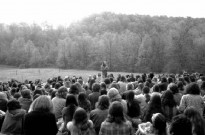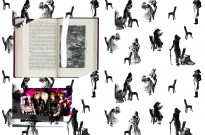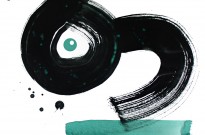Research & Development
Anthony Huberman: Lecture and Workshop
No Looking After the Internet

No Looking After the Internet is a monthly “looking group” that invites participants to look at a photograph (or series of photographs) they are unfamiliar with, and “read” the image out-loud together. In dialogue with the exhibition, HUMAN RIGHTS HUMAN WRONGS, currently on view at the Ryerson Image Centre, No Looking After the Internet will examine a selection of images from the exhibition, made available to visitors as free, miniature postcards placed throughout the gallery.
Hunch Talks

Discussion
Wednesday, February 6, 2013, 7:00 pm
Hunch Talks is a new, ongoing series of discussions at TPW R&D, placing several people in conversation, following an intuition that each of their practices has something to offer to the other. We have a hunch that something, as yet unknown but dynamic and productive will emerge.
To Nobody

Part Two
Responding to some of the concerns embedded in artist Oliver Husain’s TPW R&D exhibition, Toronto writer, director and artist Alexander Wolfson contributes a series of posts to our growing research archive TPW R&D Online. The writing is conceived as a ongoing dialogue between two nameless figures questioning the boundaries of the accessible/inaccessible in relation to representation itself. The text explores the limits of what is transmitted by an artist to whoever encounters the effects of a work. As the accompanying exhibition progresses, so will the dialogue, emerging from what occurs from within the boundaries of the space.
Belmore / Gonzales-Day / Granados / Noguchi

To explore the artists’ works and the topic of violence in collaboration rather than in isolation, the curator Liz Park and photo-scholar Judy Ditner engaged in a process of exchange. Seeking to open up each other’s readings, we jointly authored this text to point to some key issues the artists take up, and to offer partial descriptions of and ruminations on the artworks.
Introduction

Invisible Violence brings together the work of four artists – Rebecca Belmore, Ken Gonzales-Day, Francisco-Fernando Granados, and Louise Noguchi – who use photography as a point of reference for histories of violence that inform a contemporary politics of representation. Designed to incite thoughtful conversations about the representation of violence and its politicization today, this multi-part project consists of: publication of the artists’ work as a sequence of 5”x7” cards; a series of discursive events conceived as points of distribution for the publication; and this web hub that archives reflections on the discussions that take place at each event.
To Nobody
No Looking After the Internet

No Looking After the Internet is a monthly “looking group” that invites participants to look at a photograph (or series of photographs) they are unfamiliar with, and “read” the image out-loud together. In response to Deanna Bowen’s solo exhibition, Invisible Empires, at the Art Gallery of York University (AGYU), the first meeting of No Looking will place archival images of racial violence in dialogue with Bowen’s installation.
Oliver Husain
Pandy Ramada’s Bendable Displex

For our first installation of 2013 in the TPW R&D space, curator Kim Simon asked artist Oliver Husain to consider the collective spaces of looking. In response, Husain sets a mutable stage for coming together to look, experience and think, and to discuss images and our expectations around presenting them.










